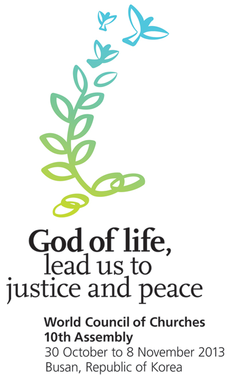Hope born in the womb of God

Rev. An Young, coordinator of the Raham Center shared her thoughts about the situation of “migrant wives” with a group of participants of the WCC assembly in the Republic of Korea.
05 November 2013
By Naveen Qayyum (*)
Lit with bright lights and adorned with colourful paintings on the walls, the Raham Centre run by the Gimhae Presbyterian Church in South Korea looks like a day-care centre for children. However, the name Raham, which literally means “womb of a woman” or “womb of God” in the Hebrew language, has deep implications for the work of the centre with the purpose of supporting “migrant wives” in Gimhae.
Also the term “migrant wives” appears out of balance with the concept of the institution of marriage, which is supposed to bring two individuals together in love and respect for a life-long companionship.
Rev. An Young, coordinator of the Raham Center, explains that these “migrant wives” are usually “arranged” by agencies that bring young women from countries like Vietnam, Cambodia and China to South Korea, where they are married to South Korean men they mostly do not know.
Young says that it is usually the South Korean men from rural backgrounds who use the services of such “marriage agencies”. These men, mostly in their late 40s, marry women from the lower economic strata who arrive to South Korea in the hope of better economic prospects. Yet, their expectations are seldom met with reality, and they often find themselves exposed to situations in which they are vulnerable to exploitation.
Young, a mother of two children and a pastor in the church, finds the experiences of these women heart-wrenching.
She tells the story of Nyao (not her real name), a 22–year–old Vietnamese woman, married to a South Korean man several years older than she is. Since the time Nyao came to Gimhae, she did household work all day long, and saying no to sexual relations was not an option for her. Nyao experienced marital rape and had no access to medical care. She was often threatened by her husband to be sent back to her home country where she had lived an impoverished life.
Young adds that Nyao’s story is but one of many.
Women in search of economic stability
It is only natural for these young women to miss their families, says Young. Language barriers and cultural differences are another challenge faced by them. The Raham Centre, Young says, brings these women together in a community. At the centre, these women along with their husbands are offered counseling and spiritual support. Here they cook together, bring their children to play, speak about their difficulties and search for solutions.
Some women come to the centre without telling their husbands. They take the risk in order to be part of this supportive community of women at the centre.
Young says that in critical situations, the centre also brings these women in touch with legal support organizations and non-governmental organizations which help them in practical ways.
When asked what inspired Young to help these women, she testifies that this was a “calling from God”.
“I was arrogant enough not to think much of these women initially,” she admits.
“In the church I met with some of the 'migrants wives'. Listening to their experiences changed my perceptions altogether. I could not believe the kind of alienation they experienced. For Korean society, mixed culture marriages are still very unusual. Apart from their own problems, children of these 'migrant wives' also face discrimination at many levels,” Young adds.
“I ask God why these women had to go through these hardships. Honestly, I am still asking this question to God, hoping to get an answer I understand,” says Young.
Despite being run by a church, the centre opens its arms to all women, regardless of their faith identities. Young reports that they have Christian, Muslim and Buddhist women who have joined the centre. They will share their stories at the World Council of Churches (WCC) 10th Assembly in Busan, as part of presentations at the BEXCO Madang hall on 5 November, 2.00 PM.
The WCC assembly is focusing on the prayer “God of life, lead us to justice and peace”.
Young says, “Stories of 'migrant wives' made me realize that they do not have families. They are not 'real’ wives. In fact, they are victims of situations based on attempting to escape poverty in their home countries.”
Young, who has been coordinating the Raham Centre for a while, thinks that “these 'migrant wives' have the potential to reform the church”.
Their resilience is one way to show how God leads people to justice and peace in unpredictable situations and through perilous journeys. Therefore, it is in a 'womb of a woman' and in the 'womb of God' that hope is born through faith, says Young.
(*) Naveen Qayyum from Pakistan works as news writer at the World Council of Churches.
Official website of the WCC 10th Assembly
High resolution photos available via photos.oikoumene.org




